In a risky mission in a combat zone, British Army veterans rescued nine lions from a Ukrainian zoo.
NGOs that rescue animals In what they claim to be the largest-ever big-cat rescue from an ongoing conflict, Breaking the Chains and Warriors of Wildlife arrived in the war-torn Black Sea port of Odessa on Monday.
At their residence in the Biopark, Odesa, where meat supplies were critically limited due to the war, the nine lions were at risk of going hungry.
The wild predators would seriously endanger civilians if Russian missiles destroyed the animal enclosures. To complete the rescue, the team had to travel tens of thousands of miles and cross three borders in just 72 hours.
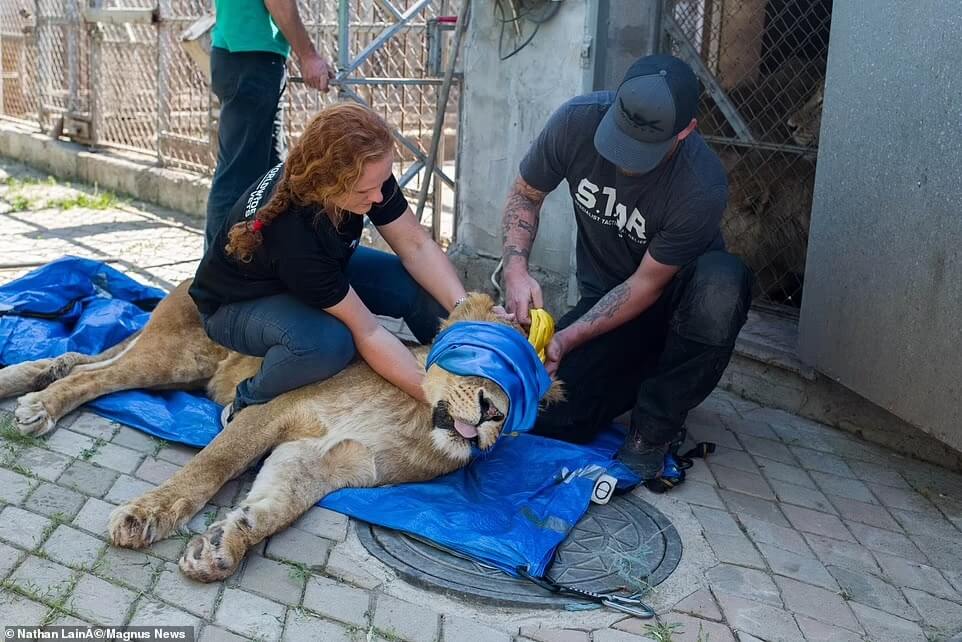
On Wednesday, a male and female cub, five female lions, and two adult male lions were securely transported to their temporary new home in Targu Mures, Romania. Lionel de Lange, the creator of Warriors of Wildlife in South Africa, came up with the idea for the mission. He collaborated on it with Gemma Campling, the director of Worldwide Vets, and Tom, the founder of Breaking the Chains and a former British Army soldier.
For security reasons, Tom, whose last name is withheld, oversaw a group that included former British Army personnel as well as individuals from the USA and Canada. Lionel de Lange, the founder of Warriors of Wildlife and a former soldier in the South African Army, stated that the ultimate goal was to fly all the lions to a new home in the Simbonga Game Reserve in South Africa or to a wildlife sanctuary in the US.
He praised his followers for their assistance in raising thousands of dollars for the trip to pay for fuel, veterinary care, and security.
“It was nice to cooperate with other people who were eager on getting this amazing task done,” said Lionel. “It was an international operation.”
“I hope that in the future, we will be able to sneak back in behind the Russians and rescue more animals together.”
“It’s wonderful for me to save any animal from a difficult circumstance, but perhaps since I’ve lived in Ukraine, it was very significant for me.”
Read more Cute Moments: Lions Climbing A Tree To Escape The Heat In Tanzania
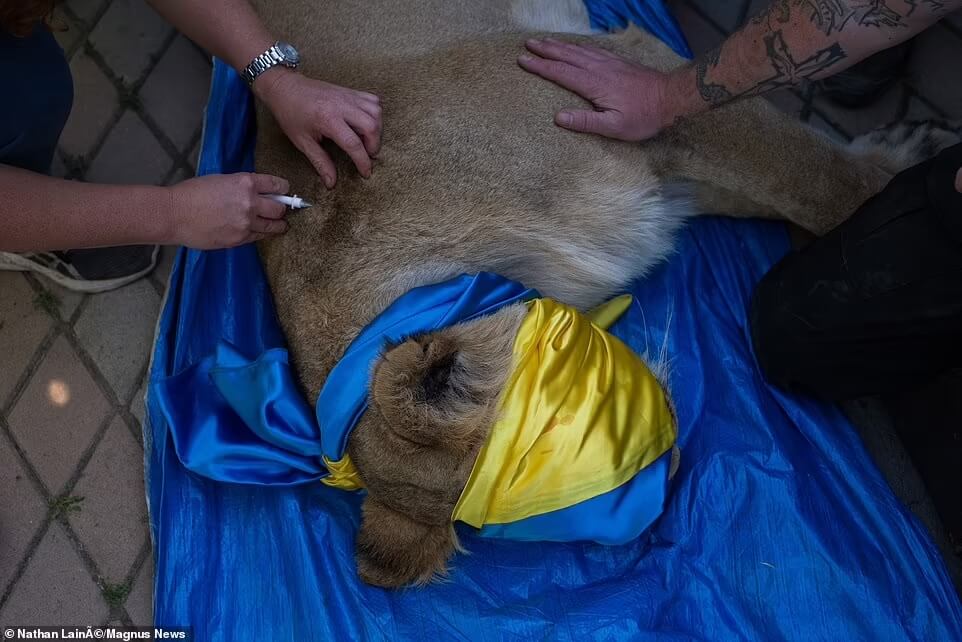
The lions’ future was quite grim when they were living in Odesa because it appeared that the war would not finish anytime soon.
“However, none of these animals are going to be left behind while there are people like me, Tom, and Gemma, along with the incredible people we work with and who backed us.”
The 34-year-old creator of Breaking the Chains from Yorkshire served 18 years in the British Army. Other veterans, including his former colleague Gaz and soldiers Steve and TJ, made up his team.
Tom, who received a medical discharge due to PTSD, attributes his recovery to the help he received from his dog Gypsie, a former military search dog. He claimed, “An animal saved my life. We are in Ukraine because I am aware of the genuine worth and beauty of animals and because I want to do everything in my power to rescue their lives.
“My ground team is made up entirely of veterans. Therefore, these men enter combat zones that are currently under Russian onslaught and have troops on the ground. These are the places of conflict where we work.
“We also have volunteers who have come to this area to watch out for the animals.”
“We had two volunteers with us on this mission, but the ground team is mostly made up of veterans,” the statement reads.
Tom claimed that as soon as Lionel informed him about the lions’ condition in Odesa, he knew his squad could assist.
“It required a lot of tools and labor, so when I got the call, I immediately answered. Sure thing, no worries, just tell me when,” he added.
“Odesa is an active battle zone; ships can bombard from the sea and they get missile strikes, so they are constantly under danger.”
“We enter battle zones and have frequently been between 600 and 800 meters from the Russian front line.”
“We’ve repeatedly had bombs crash practically at our feet while removing animals from Ukraine, so we knew we could aid in this effort.”
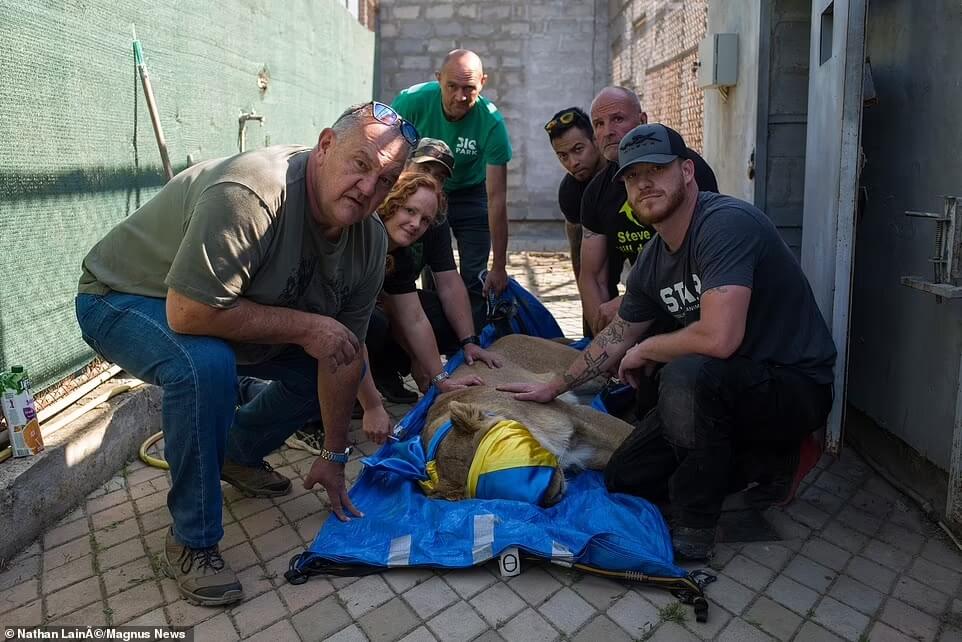
Tom stated that meeting Gemma and Lionel was a wonderful experience and that his staff used their own knowledge to guarantee the safety of every lion during the transfer. Along with 4X4 backup vehicles, the convoy also featured a sizable military wagon that Tom’s team had transported from the UK. To protect their priceless cargo, more sturdy cages, homemade stretchers, and climbing apparatus were also required.
He remarked, “My staff was excellent throughout, as they usually are. The vet Gemma was phenomenal, Lionel was great with the part he performed, and my team was great.”
“The more veterans here,” Steve and Gaz said. I served with Gaz for 18 years. Gaz likes animals, and he became friends with me. Steve is the same. TJ developed a deep affection for our work and our motivations.
They are all animal lovers and are interested in our mission.
“It was amazing to spend time with the lions while we had them in the cars and while we waited at the borders.”
“You have just enough time to create that fleeting yet lovely link. The wonderful thing about animals is that they may develop a level of trust that allows them to feel safe with you without allowing you to put them in a cage with them.”
After they were taken out of the anesthesia, a couple of lions began to scream and growl, but as soon as we started traveling, they stopped.
Tom claimed that all of their expenses were covered by donations, and more were planned in the future.
Related post The Lion At The Chinese Zoo Makes Visitors Admire His New Hairstyle
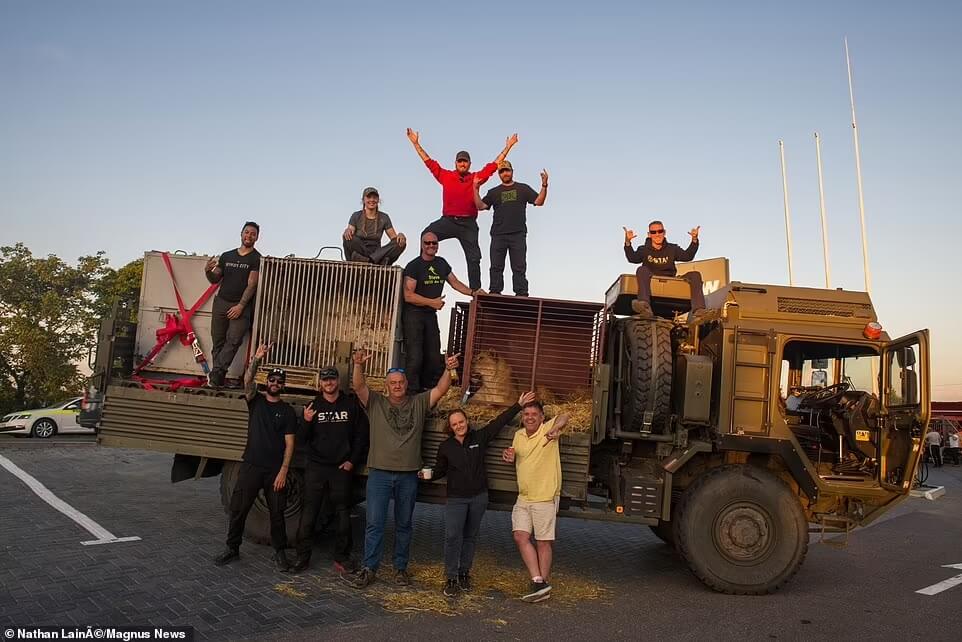
Now that it has significantly expanded, he continued, “We are constructing our own shelter in a more secure region of Ukraine to the west.”
For the animals that suffer severe injuries while serving on the front lines, “We have also established our own emergency trauma veterinarian facility.”
From the time they were drugged until they had traveled hundreds of kilometers, each lion required specialized veterinarian care. Dr. Gemma Campling, a graduate of the veterinary program at Nottingham University, established Worldwide Vets to support global animal care and conservation.
“This is the first time I’ve removed carnivores from a conflict area,” she added.
It’s unusual to relocate an entire pride, anesthetize them all, dart them, and move them securely in a short amount of time.
“I was in Ukraine for a few weeks exploring better ways to assist work with horses and small animals when this opportunity arose. Despite the short notice, I was chosen because of my extensive background in wildlife management.”
Since you can’t handle a lion, dealing with wildlife in a combat zone is far more difficult than dealing with dogs and cats.
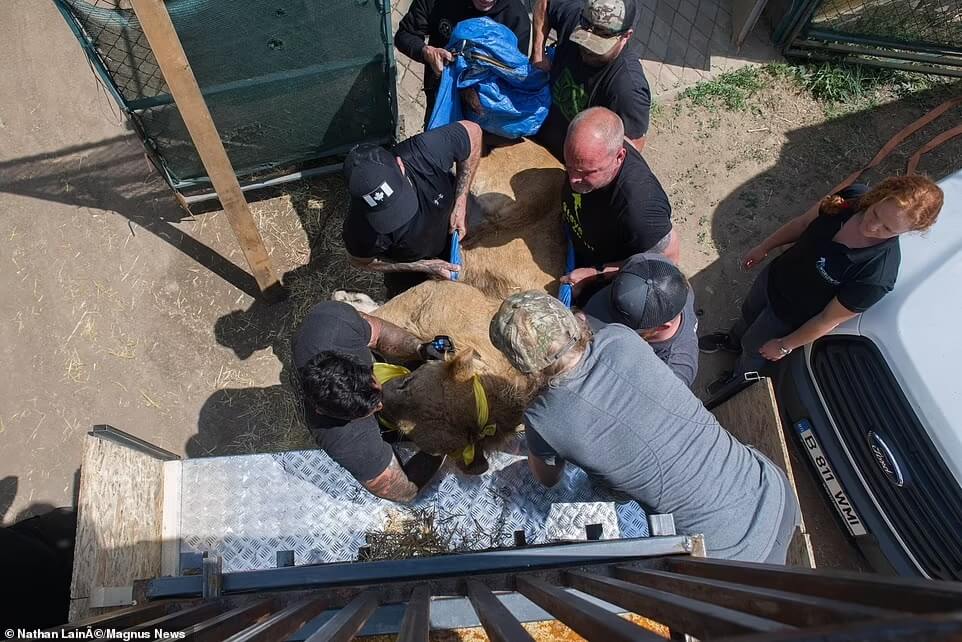
As the vet in charge of the procedure, it is my responsibility to keep everyone and the animals safe. “You have to be really accurate with the anesthesia or immobilization. You have to be so accurate.”
“We had to constantly stay alert since shelling may happen all around us.”
“Because the truck we were carrying the lions onto was so high, it required a team effort from six to eight boys to hoist each animal above shoulder level using a makeshift stretcher because there are no wildlife stretchers available in a combat zone.”
Post for you The Lion That The Man Rescued As A Sickly Cub Gives Him A Hug
“The largest male, in my opinion, was above 250 kg.”
“Then, I had to make sure that each lion was securely seated in its pen, ensure that their airways were unobstructed, and keep an eye on the anesthesia when they awoke.”
“I spent hours watching the lions watch them sleep and doing checks every couple of hours when we stopped while they were in the back of the truck. I did my best to control their stress so they may be as content as possible. The lions had to work hard and suffer the trip, but they now have a secure future ahead of them.”
Gemma emphasized the importance of saving animals from a conflict zone, particularly when dealing with huge, dangerous carnivores.
“A carnivore is a really dangerous animal, and if it escapes in a warzone because a zoo is bombed, you’ve got a big risk to human life,” she said, adding that it was crucial to get rid of the lions to protect people’s lives given the possibility of an invasion.
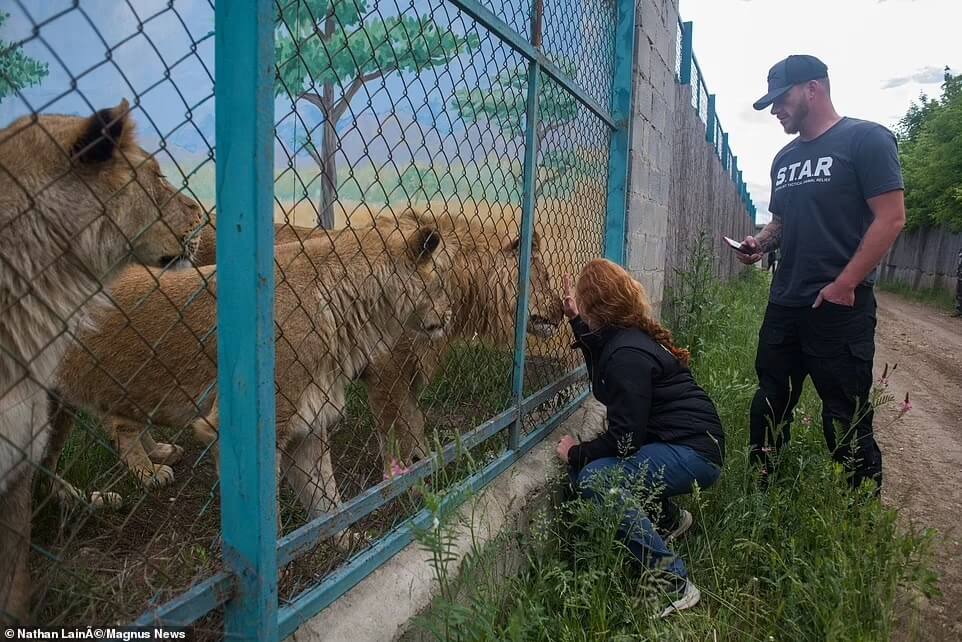
The zookeeper was visibly unhappy the morning we loaded the lions; it was clear he loved the animals and was sad to see them go.
“The war is destroying everyone’s lives, and we are taking care of the animal side. Many people in Ukraine won’t leave their animals behind.”
“When the war in Ukraine began, we wanted to assist because there is a scarcity of veterans on the ground because a lot of them were male and were drafted into fighting,” the organization stated.
Tom has already returned to Ukraine with his crew after the lions were saved, and Lionel and Gemma have sworn to do the same to continue aiding the animals affected by Russia’s invasion of Ukraine.
Don’t skip A Family In South Africa Shocked Because 6 Lions Entered Their Deck House